The genetic basis for Vibrio cholerae interactions with Drosophila melanogaster
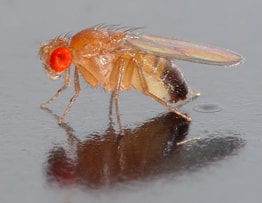
We use the fruit fly Drosophila melanogaster as a model organism in which we interrogate the genetic basis for Vibrio cholerae virulence and colonization of related arthropods. Our lab is building on the recent finding that a two component system in V. cholerae, the CrbSR system, influences virulence by manipulating levels of acetate in the Drosophila GI tract.
Research projects in the lab involve taking genetic, biochemical and bioinformatics approaches to studying mechanisms of signal sensing and transduction that influence bacterial gene expression and host physiology.
Research projects in the lab involve taking genetic, biochemical and bioinformatics approaches to studying mechanisms of signal sensing and transduction that influence bacterial gene expression and host physiology.
The CrbS/R Two Component System in Pseudomonas entomophila and P. aeruginosa
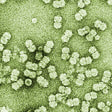
We are also studying the entomopathogen Pseudomonas entomophila in order to understand its mechanisms of Drosophila melanogaster virulence. This project is in collaboration with Josh Sharp at Northern Michigan University.
CrbS/R control of the acetate switch in Vibrio fischeri
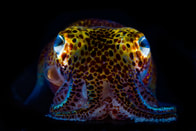
We are looking at the conservation of CrbSR-dependent acs expression in Vibrio fischeri, a symbiont of the Hawaiian bobtail squid (right), together with Mark Mandel at University of Wisconsin-Madison! This project will also be incorporated into a course-based undergraduate research experience (CUR) in Biol-271 Microbiology!
House flies as a vector for Vibrio cholerae?
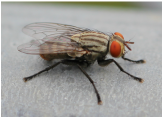
We have been investigating the potential of V. cholerae to colonize the house fly, Musca domestica, a possible disease vector in areas where cholera is endemic, together with John Stoffolano at the University of Massachusetts Amherst and Ghada El-Bassiony at Cairo University.
Our model Vibrio cholerae strains SIO and TP are non-toxigenic

In our lab, we use two isolates of V. cholerae from the coast of southern California. These strains, named 'SIO' (isolated off the pier at Scripps Institution of Oceanography, La Jolla, CA) and 'TP' (isolated in Torrey Pines Estuary, La Jolla, CA), do not carry the genes required for causing the diarrheal disease cholera, but can serve as model organisms for environmental studies of this species.
Sea Education Association and SEA Semester
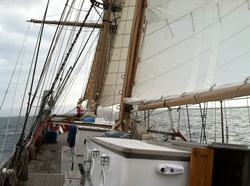
Our lab at Amherst College offers opportunities for students to continue research projects started while participating in the Sea Education Association (SEA) Semester at Sea or Summer programs. SEA offers students unparalleled opportunities to learn about and research the biology (and chemistry and geology) of the oceans, all while learning to sail a 120' tall ship with the Sea Education Association of Woods Hole, MA.